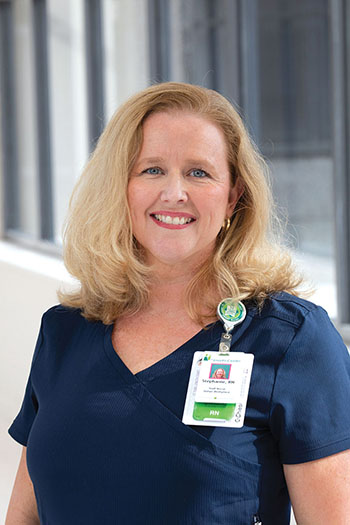Ask A Magnet Nurse
Newborn Screening Helps Uncover Any Unseen Issues As Early As Possible
Stephanie Schnaible RN, BSN, RNC-NIC

Neonatal Intensive Care Unit
Smart Living: Typically about a day after a baby is born, a nurse will come in and prick their heel to get a blood sample. Why is this necessary?
Stephanie Schnaible: From one small sample, we can screen newborns for more than 30 possible disorders that wouldn’t otherwise be detected at birth. This blood sample goes through a metabolic screening which can detect issues like phenylketonuria, or PKU, and other metabolic errors. The sample is also tested for thyroid issues and diseases such as sickle cell and cystic fibrosis. Early detection is key for these issues.
We also check the bilirubin level in a newborn. Bilirubin is a bi-product of red blood cells breaking down, so if its level is too high it can cause infant jaundice, which is a yellowing of the skin and eyes. High bilirubin levels require a special light therapy called phototherapy and follow-up tests may continue in the pediatrician's office.
SL: What other screenings are done before the baby leaves the hospital?
SS: All babies have a hearing screening done. It is a painless test which uses earphones and sensors on the baby’s head to detect the hearing nerve’s response. If they don’t pass, this doesn’t necessarily mean they have permanent hearing loss but it will require more testing later.
There is also the Critical Congenital Heart Disease, or CCHD, screening. This is also a painless test that involves a device called a pulse oximeter. Its sensors are placed on the right wrist and on one leg to measure the amount of oxygen in the blood. Low levels may indicate CCHD and the doctor will typically order more specific tests.
For babies under five pounds or delivered under 37 weeks, we may also do a Car Seat Challenge. The baby’s vital signs are monitored while they are in their car seat for 90 minutes. This is to make sure that the baby is breathing fine while in their car seat. If they don’t pass, your baby may need a specialized seat that will keep them secure but also allow them to breathe properly.
SL: Most of these screenings are conducted in the mom’s patient room, whenever possible. Why is this important?
SS: As nurses, we always want to involve parents in as much of their baby's care as possible. Parent and infant bonding is so important and we do everything we can to promote it. Part of our role is to keep the parents updated and educated, and to always be there to answer questions about their newborn’s care.